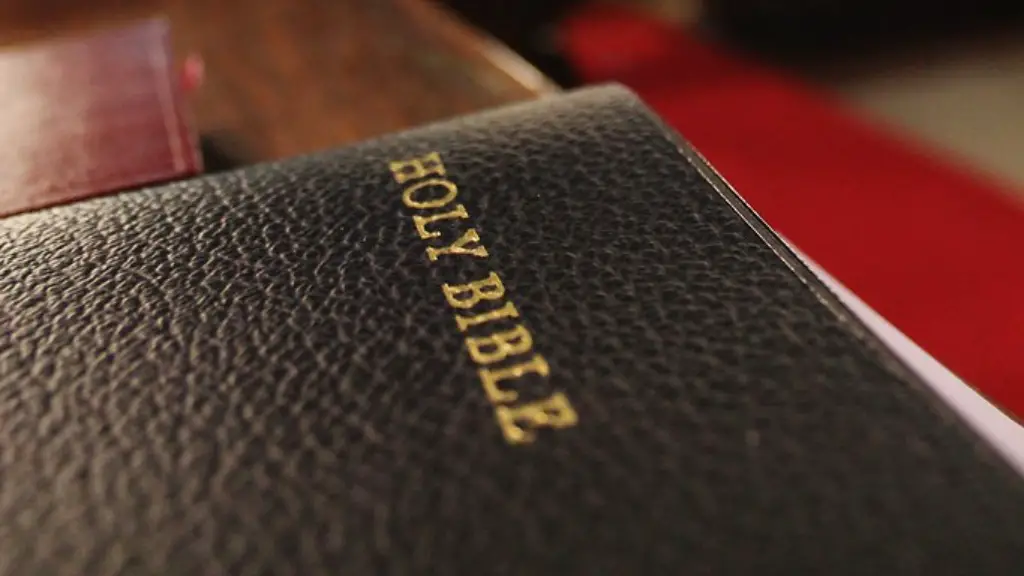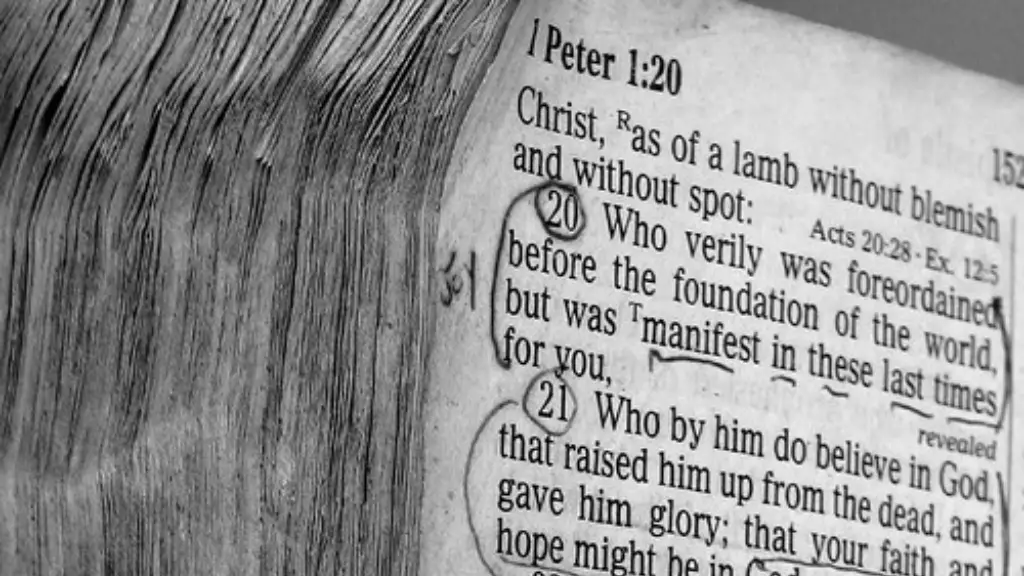The Bible is an ancient religious text, filled with fascinating customs and spiritual insights that millions of people still look to today for hope and guidance. One of the terms mentioned frequently in the Bible is the Tabernacle, which is a portable temple that carried sacred items for religious rituals. Although the Tabernacle itself is no longer used, its concept still provides meaningful instruction and reflection for individuals, churches, and institutions.
The Tabernacle was first described in the book of Exodus. According to the Old Testament, God told Moses to instruct the Israelites to build a “habitation” for the presence of Yahweh. The exact dimensions and materials to be used in constructing the Tabernacle were revealed to Moses, who subsequently relayed them to the people in precise detail. The building was made of fine cloths, planks of special acacia wood, precious metals, and other materials.
Once built, the Tabernacle served as a temporary dwelling and as a place for worship. Inside, the Israelites would bring offerings, partake in ritual sacrifices, and consult with the priests, who were responsible for caring for the sacred items which were kept in the Holy of Holies. This included a golden altar, an incense altar, and an ark of the covenant.
The concept of the Tabernacle was reinterpreted by early Christians as an allegory for the person of Christ. For instance, they believed that Christ was the living temple and mediator between man and God. Similarly, many churches and religious institutions now use the concept of the Tabernacle to discuss the mission of Jesus and human redemption.
The idea of a sacred space, where one can pause and experience God’s presence, is still relevant for many individuals and communities today. Many churches and faith communities have adopted the concept of the Tabernacle, using it to focus attention on the importance of creating a safe and sacred place for meaningful worship. This includes the need for individuals to create a Tabernacle in their own lives, where they can pause and experience peace and comfort in their daily lives.
In addition to its spiritual significance, many people see the Tabernacle as a metaphor that can help us to understand the various aspects of our society. In particular, the concept of a safe, sacred space can be used to describe our need for places to retreat from everyday stress and explore our faith in a more meaningful way. This need is especially strong in today’s world, where we often feel overwhelmed and frustrated by the constant onslaught of news and information. The idea of a Tabernacle is an important reminder that we can find insight and peace by stepping away from the noise and creating a private space to reflect.
Symbolic Representations of the Tabernacle
In addition to representing a physical space for worship, the Tabernacle has become a powerful symbol in many Christian churches. For instance, many churches display a Tabernacle in their main sanctuary as a reminder of the importance of creating a sacred space in our lives. Similarly, many Christian organizations use the Tabernacle symbol as a logo to represent their commitment to creating a safe and supportive environment.
The Tabernacle has also taken on special symbolic significance for many Christians. In particular, some theologians believe that the Tabernacle is symbolic of Christ’s mission of redemption, as well as a reminder of the importance of the relationship between man and God. Additionally, the Tabernacle is a powerful metaphor for the presence of God in our lives and the need to strive towards holiness and virtue.
Moreover, the concept of a Tabernacle has become an important symbol for many non-Christian religious institutions. Many people of faith have used the concept of a Tabernacle to discuss the principles of sacredness and the importance of creating a safe, comforting sanctuary in our lives.
Modern Applications of the Tabernacle
Although the physical Tabernacle is no longer used, its concept is still powerful and relevant in the modern world. For instance, many churches and other religious institutions still use the concept of a Tabernacle as a means to discuss the importance of creating a private, sacred space to retreat and explore our faith. This is especially true in a society where many people feel overwhelmed and anxious, and in desperate need of a place to slow down and reconnect with their spirituality.
Some modern faith communities, such as the Quakers, have even adopted the concept of a physical tabernacle, in which their members gather for silent, reflective worship. Other faith organizations, such as 12 Step groups, use the concept of a Tabernacle to emphasize the importance of creating a spiritually safe place where individuals can discuss their struggles in confidence and comfort.
The concept of a Tabernacle is also useful in a variety of other contexts. For example, many secular organizations use the concept of the Tabernacle to discuss the importance of creating a culture of collective safety and respect. Additionally, individuals can use the concept of a Tabernacle as a means to create a refuge from the stresses of everyday life.
Conclusion
The concept of a Tabernacle is an ancient Biblical one, with powerful lessons for the modern world. Although the physical Tabernacle is no longer used, its concept is still powerful and relevant for individuals and institutions alike. Churches and religious institutions can use the concept of the Tabernacle to discuss the importance of creating a sacred space, both in their physical environments and in their lives. Moreover, individuals and organizations of all kinds can use the idea of a Tabernacle to create a space of safety and respite, whether it is spiritual or secular in nature.
Tying It To Past Ideas
The Tabernacle concept is deeply connected with ideas and stories from the past, such as the Israelites’ construction of the original Tabernacle or Christ serving as a living Tabernacle. Early Christians interpreted the Tabernacle as a metaphor for the person of Christ and spiritual redemption, and used the concept to support their own spiritual mission. The concept was even used by modern faith communities such as the Quakers and 12 Step groups, to discuss creating a space for silent, reflective worship and a place to discuss struggles.
Moreover, the concept of a Tabernacle has also been used by secular organizations to discuss creating a culture of collective safety and respect. One of the key lessons from the Tabernacle concept is that it is important to step away from daily stresses and create a private space for meaningful reflection, whatever the faith or context. The concept of a Tabernacle remains relevant in today’s world for individuals and communities alike.
Patterns In History
The concept of a Tabernacle reflects certain patterns that can be seen throughout history. Throughout the Bible, the Tabernacle has been interpreted and appropriated by many different groups. Early Christians reinterpreted it as an allegory for the person of Christ, while modern faith groups adopted the concept to talk about a need for a safe and supportive environment. Contemporary secular organizations also draw upon the concept to discuss the importance of creating a culture of collective safety and respect in the workplace.
The Tabernacle can also be seen as a metaphor for our own private space. It serves as a reminder of the importance of creating a refuge from the noise and chaos of daily life and connecting with one’s own faith and spirituality. This idea is particularly important in today’s world, where many of us are overwhelmed and overstimulated by the relentless onslaught of news and information. Taking the time to step away and create a Tabernacle in our lives — however we define it — can bring comfort and peace.
Implications For The Present
The idea of a Tabernacle has strong implications for our modern world. Although the physical Tabernacle is no longer used, its concept remains relevant for individuals and communities of faith. Its lessons can be applied to our modern lives, in an effort to create a space of peace and respite from the chaos of everyday life. This idea is particularly important for those who feel overwhelmed and anxious in our current environment, as it encourages us to take time for reflection and reconnect with our spiritual selves.
Additionally, the modern Tabernacle concept can serve as a reminder of our collective responsibility to create a safe and supportive environment. This is especially relevant to our work environments, where organizations can use the importance of creating collective safety and security to foster meaningful relationships and positive outcomes. This can include measures such as defending the rights of different individuals, ensuring the welfare of all members, and speaking out against injustice.
The powerful concept of a Tabernacle, with its various interpretations over the centuries, can bring us comfort, guidance, and hope. From its original description in the Bible to its modern day applications, the Tabernacle offers an important reminder to create a sacred space in our lives and connect with our spirituality, in both private and collective contexts.





